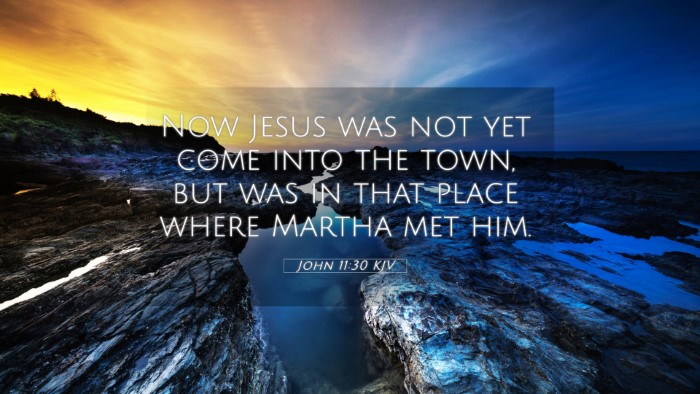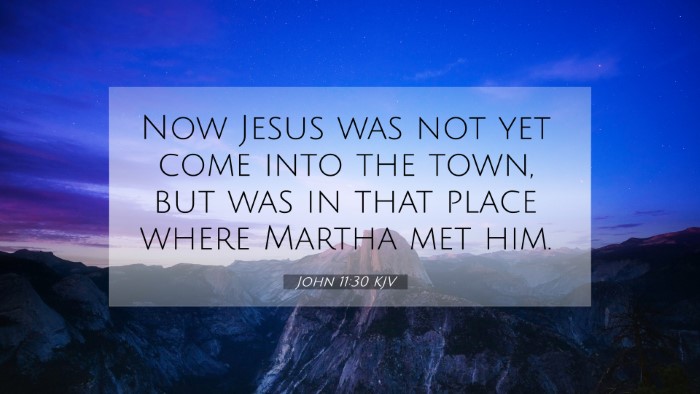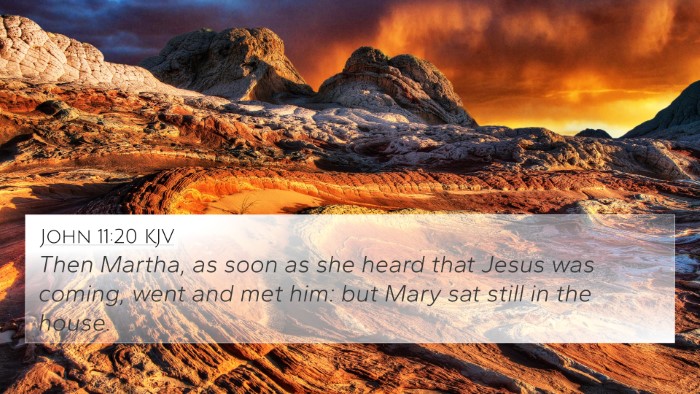Understanding John 11:30
John 11:30 states: "Now Jesus had not yet come into the town, but was in that place where Martha met him." This verse occurs in the context of the narrative surrounding the death of Lazarus and illustrates the profound emotional and theological significance of Jesus' actions and whereabouts at a critical moment.
Contextual Overview
In the preceding verses, we witness Martha's grief over her brother's death and her faith in Jesus. The mention that Jesus had not yet arrived in Bethany reveals the timing and purpose of His interactions—a motif that runs throughout the Gospel of John.
Commentary Insights
Matthew Henry's Commentary
Matthew Henry emphasizes the intentionality of Jesus’ delay, noting that it was important for demonstrating His power over death and ultimately glorifying God. Even though Martha is distraught, Henry highlights that her encounter with Jesus before entering town signifies a pivotal spiritual moment, a place ripe for revelation.
Albert Barnes' Notes
Albert Barnes reflects on the geographical and emotional aspect of this passage. He points out that Martha's meeting Jesus outside the town signifies her desperation and her willingness to seek divine help. The fact that Jesus was not in town serves as a setup for the miraculous work He is about to perform, showcasing that His arrival is timely even if it appears otherwise.
Adam Clarke's Commentary
Adam Clarke discusses the cultural significance of Martha’s approach. He notes that traditionally, mourners would typically remain in their homes. Martha’s action of coming out to seek Christ reflects her profound faith and her recognition of Jesus’ authority. Clarke elaborates on how this moment before entering the town is pivotal for the unfolding of the narrative, culminating in the resurrection of Lazarus.
Thematic Connections
This verse highlights several key themes in the Gospel of John, particularly the intersection between human grief and divine intention. Jesus' delay can be perceived as both a test of faith and a chorus of hope.
Cross-Referencing Biblical Texts
- John 11:1-6: This passage sets the stage for understanding why Jesus delayed His coming.
- John 11:21-27: Here, Martha expresses her faith in Jesus to resurrect her brother.
- Luke 7:11-17: This account of raising the widow's son echoes the theme of resurrection power.
- John 14:1-3: Jesus comforts His disciples, linking death to eternal life.
- Romans 8:28: The idea that God works all things together for good emerges as an underlying theme.
- 2 Corinthians 1:3-4: God as the source of all comfort connects to Martha's experience.
- Hebrews 11:1: The definition of faith speaks to Martha's belief in Jesus even amid despair.
Conclusion
John 11:30 serves as a crucial link in the narrative of Lazarus' resurrection, emphasizing the tension between human sorrow and divine purpose. The cross-references enrich our understanding, inviting us to explore how various scriptures speak to themes of faith, timing, and divine authority. Each commentary enhances our grasp of the significance of this moment in Jesus' ministry.
Exploring Connections Through Cross-Referencing
Engaging in comparative Bible verse analysis allows readers to discern the rich dialogues between biblical texts. By identifying cross-references and thematic connections, believers can deepen their understanding of how scriptures relate to one another, thereby enriching their faith journeys.



